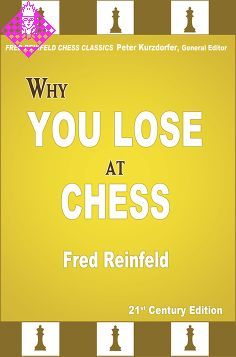Artikelnummer
LXREIWYLAC
Autor
Why You Lose at Chess
128 Seiten, kartoniert, Russell Enterprises, 1. Auflage 2016
The Way to Better Chess!
Why You Lose at Chess is vintage Reinfeld. He pulls no punches, showing the reader why he or she loses chess games. This is quite a remarkable feat when you think about it, because he never saw any of the games the vast majority of his readers played. But Fred knew the thinking that lurks behind poor chess decisions, and he let us all know what is wrong or irrelevant or misguided about the types of moves he witnessed far too often.
Beginning with a chapter on self-appraisal, he links a lack of understanding of your own personality with erroneous choices of moves and plans in a chess game. He goes on to delve into playing blindly (with no idea what you are actually doing) or by rote (memorization vs. understanding).
A couple of technical mistakes he points out include a lack of understanding of the tremendous importance controlling the center makes as well as knowing what features in a position should be present in order for an attack to be likely to work.
Among other observations, he gets on amateur players for being easily bored, impatient, lazy, and stubborn. And all of this comes with lucid examples from master play that back up his contentions.
All in all, this is an outstanding treatment of a subject players generally do not pay enough attention to. It has the potential to open anyone’s eyes to what playing strong chess can be like. Let Fred Reinfeld show you the way to better chess…
Why You Lose at Chess is vintage Reinfeld. He pulls no punches, showing the reader why he or she loses chess games. This is quite a remarkable feat when you think about it, because he never saw any of the games the vast majority of his readers played. But Fred knew the thinking that lurks behind poor chess decisions, and he let us all know what is wrong or irrelevant or misguided about the types of moves he witnessed far too often.
Beginning with a chapter on self-appraisal, he links a lack of understanding of your own personality with erroneous choices of moves and plans in a chess game. He goes on to delve into playing blindly (with no idea what you are actually doing) or by rote (memorization vs. understanding).
A couple of technical mistakes he points out include a lack of understanding of the tremendous importance controlling the center makes as well as knowing what features in a position should be present in order for an attack to be likely to work.
Among other observations, he gets on amateur players for being easily bored, impatient, lazy, and stubborn. And all of this comes with lucid examples from master play that back up his contentions.
All in all, this is an outstanding treatment of a subject players generally do not pay enough attention to. It has the potential to open anyone’s eyes to what playing strong chess can be like. Let Fred Reinfeld show you the way to better chess…
| EAN | 9781941270264 |
|---|---|
| Gewicht | 180 g |
| Hersteller | Russell Enterprises |
| Breite | 15,2 cm |
| Höhe | 22,8 cm |
| Medium | Buch |
| Erscheinungsjahr | 2016 |
| Autor | Fred Reinfeld |
| Sprache | Englisch |
| Auflage | 1 |
| ISBN-13 | 978-1941270264 |
| Seiten | 128 |
| Einband | kartoniert |
| Name | Russell Enterprises |
|---|---|
| Adresse | 234 Depot Road Milford, CT 06460 USA |
| Internet | www.Russell-Enterprises.com |
| hwr@russell-enterprises.com |
Verantwortlicher Importeuer:
| Name | Schachversand Niggemann |
|---|---|
| Adresse | Schadowstraße 5 48163 Münster Deutschland |
| info@schachversand.de | |
| Internet | www.schachversand.de |
005 From the Editor
Chapter 1
007 You Have No Idea What Kind of Chess Player You Are
You lose because you have certain basic misconceptions about your play
Know yourself and your opponent
Chess personality quiz
Discard your alibi
Have faith in your play
Differentiate among your opponents
The shock value of surprise
The eternal triangle
Chapter 2
031 You Play the Openings Blindly or by Rote
Playing the opening blindly
Playing the opening by rote
Unforeseen crisis
Crime and punishment
Chapter 3
041 You Don’t Know the One Basic Principle of Chess Play: Control the Center
What is the center?
How do you control the center?
Why is it important to control the center?
The powerful pawn center
The powerfully centralized piece
Striking through the Center
You’re bothered by unusual openings
Chapter 4
054 You Lose Because You Can’t See One Move Ahead
You’re obsessed by the ”obvious“ move
Beware the forced move
Chapter 5
064 You Don’t Know When to Attack or When to Defend
When to attack
Defender’s queen out of play
Attacker’s local superiority
Defender’s pawn weaknesses
When not to attack
When to defend
Chapter 6
079 You Lose Because You Ignore the Odds
What is an endgame?
Mating attacks in the endgame
Brilliant sacrifices in the endgame
Queening a pawn
King and pawn endings
Zugzwang, or the squeeze play
Chapter 7
089 You Lose Because You Play the Board and Not the Man
Playing the man and not the board
Bamboozling a world champion
How to beat your equals
Chapter 8
098 You Lose Because You’re Easily Bored
The winning technique
Missing the point
Give a man enough rope…
Chapter 9
107 You Lose Because You’re Lazy
Winning the hard way
Meet the challenge!
You lose because you dawdle
Chapter 10
118 You Lose Because You’re Stubborn
Half a loaf is better than none
A bishop is better than a knight
Overprotecting the castled position
When pawn moves are good
128 Notes from the Editor
Chapter 1
007 You Have No Idea What Kind of Chess Player You Are
You lose because you have certain basic misconceptions about your play
Know yourself and your opponent
Chess personality quiz
Discard your alibi
Have faith in your play
Differentiate among your opponents
The shock value of surprise
The eternal triangle
Chapter 2
031 You Play the Openings Blindly or by Rote
Playing the opening blindly
Playing the opening by rote
Unforeseen crisis
Crime and punishment
Chapter 3
041 You Don’t Know the One Basic Principle of Chess Play: Control the Center
What is the center?
How do you control the center?
Why is it important to control the center?
The powerful pawn center
The powerfully centralized piece
Striking through the Center
You’re bothered by unusual openings
Chapter 4
054 You Lose Because You Can’t See One Move Ahead
You’re obsessed by the ”obvious“ move
Beware the forced move
Chapter 5
064 You Don’t Know When to Attack or When to Defend
When to attack
Defender’s queen out of play
Attacker’s local superiority
Defender’s pawn weaknesses
When not to attack
When to defend
Chapter 6
079 You Lose Because You Ignore the Odds
What is an endgame?
Mating attacks in the endgame
Brilliant sacrifices in the endgame
Queening a pawn
King and pawn endings
Zugzwang, or the squeeze play
Chapter 7
089 You Lose Because You Play the Board and Not the Man
Playing the man and not the board
Bamboozling a world champion
How to beat your equals
Chapter 8
098 You Lose Because You’re Easily Bored
The winning technique
Missing the point
Give a man enough rope…
Chapter 9
107 You Lose Because You’re Lazy
Winning the hard way
Meet the challenge!
You lose because you dawdle
Chapter 10
118 You Lose Because You’re Stubborn
Half a loaf is better than none
A bishop is better than a knight
Overprotecting the castled position
When pawn moves are good
128 Notes from the Editor
Mehr von Russell Enterprises
-
 The Modern Gurgenidze25,50 €
The Modern Gurgenidze25,50 € -
 The Modern Spanish14,95 € Regular Price 29,95 €
The Modern Spanish14,95 € Regular Price 29,95 € -
 The London Files29,95 €
The London Files29,95 € - Mehr von Russell Enterprises





